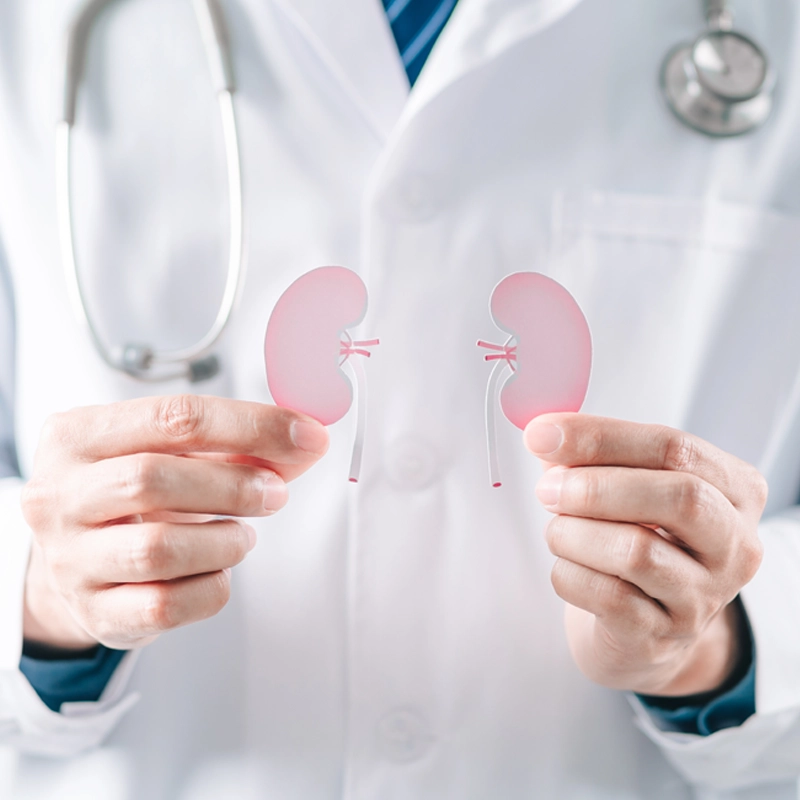
Diabetes, a chronic metabolic disorder affecting millions worldwide, can have devastating consequences if not managed effectively. One of the most severe complications of diabetes is kidney failure, also known as diabetic nephropathy. In this blog, we will explore the connection between diabetes and kidney failure, and exploring symptoms, discuss preventative measures and treatments, and shed light on important points to consider for maintaining kidney health.
Understanding Diabetes and Kidney Failure
Diabetic nephropathy refers to kidney damage caused by long-standing high blood sugar levels in individuals with diabetes. Over time, uncontrolled diabetes can impair the small blood vessels in the kidneys responsible for filtering waste products from the blood.
This damage can lead to reduced kidney function and, ultimately, kidney failure. Factors such as poorly managed blood sugar levels, high blood pressure, genetic predisposition, and lifestyle choices can increase the risk of developing kidney failure in individuals with diabetes.
Identifying the Symptoms
In the early stages, kidney damage caused by diabetes may not exhibit any noticeable symptoms of kidney failure and Diabetes. However, as the condition progresses, common indicators may include:
- Increased urination
- Fatigue
- Swelling in the legs and ankles
- Persistent itching
- Unexplained weight loss.
Recognizing these signs and seeking medical advice promptly is crucial to prevent further damage.
Preventive Measures and Precautions
Blood sugar management: Keeping blood sugar levels within the target range is crucial to reduce the risk of kidney damage. Regular monitoring, following a balanced diet, exercising, and adhering to medication and insulin regimens are essential.
Blood pressure control: High blood pressure is a common risk factor for kidney damage. Individuals with diabetes should maintain blood pressure below 130/80 mm Hg through lifestyle modifications, medication, and regular check-ups.
Healthy lifestyle choices: Quitting smoking, limiting alcohol consumption, and maintaining a healthy weight can help protect kidney function.
Regular check-ups: Routine monitoring of kidney function through blood and urine tests can help detect any signs of kidney damage at an early stage, allowing for timely intervention.
Medication review: Some medications can potentially harm the kidneys. It is crucial for individuals with diabetes to discuss their medications with healthcare professionals and ensure they are kidney-friendly.
Treatment Approaches
Blood sugar control: Achieving and maintaining optimal blood sugar levels can significantly slow down the progression of kidney damage. This may involve lifestyle changes, oral medications, and insulin therapy.
Blood pressure management: Medications such as ACE inhibitors and angiotensin receptor blockers (ARBs) are commonly prescribed to lower blood pressure and protect the kidneys. Regular check-ups and medication adjustments are necessary to ensure optimal control.
Dietary modifications: Limiting salt, phosphorus, and potassium intake can help reduce strain on the kidneys. A registered dietitian can provide personalized guidance on kidney-friendly meal planning.
Dialysis: In advanced cases of kidney failure, dialysis becomes necessary to perform the kidney's filtration function artificially. Hemodialysis and peritoneal dialysis are the two main types, and the choice depends on the patient's overall health and preferences.
Kidney transplantation: For suitable candidates, kidney transplantation offers the best long-term outcome. A healthy kidney from a living or deceased donor is surgically transplanted into the patient's body, replacing the failed kidney.
Importance of Early Detection
Regular screenings and check-ups are essential for individuals with diabetes to detect kidney damage in its early stages.
Routine tests, such as urine albumin and serum creatinine tests, can help identify kidney abnormalities and allow for timely intervention, potentially preventing further deterioration.
Conclusion
Diabetes and kidney failure are closely intertwined, emphasizing the importance of comprehensive diabetes management to preserve kidney health. By following preventive measures, maintaining blood sugar and blood pressure within target ranges, adopting a healthy lifestyle, and seeking regular medical care, individuals with diabetes can significantly reduce their risk of developing kidney failure.
Sakra World Hospital in Bangalore offers top-notch treatment for diabetes, focusing on early detection and timely intervention, coupled with appropriate treatments and necessary lifestyle adjustments, and offer a solution to kidney problem caused by diabetes. This approach can slow down or halt kidney damage, protecting kidney function and enabling a fulfilling life.
